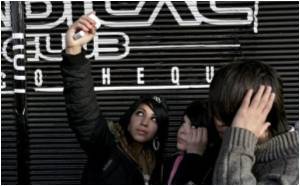
"If you walked into a typical group treatment for adolescent sex offenders, you might notice a lot of focus on social skills, like how to approach a girl, how to deal with conflict and understanding non-verbal communication," said Dr. Michael C. Seto, lead author of the study.
"Our research suggests that social skills training is not what young sex offenders need most in order to be rehabilitated. Discussing sexuality-early exposure to sex or pornography, sexual fantasies, and sexual arousal-would likely get us closer to understanding why the offenses were committed and prevent similar ones from being committed again," he added.
Seto, of the Royal Ottawa Health Care Group, and Dr. Martin Lalumiere, of the University of Lethbridge in Alberta, Canada, conducted a meta-analysis of 59 independent studies comparing a total of 3,855 male adolescent sex offenders with 13,393 male adolescent non-sex offenders between ages 12 and 18.
Social incompetence is generally viewed as a typical characteristic of adolescent sex offenders-a belief that influences treatment programs that emphasize teaching appropriate social skills.
However, the new study found no significant difference between adolescent sex offenders and adolescent non-sex offenders in terms of social competence or social skills.
This indicates that social incompetence does not help explain why some adolescents commit sex crimes rather than other kinds of crimes, and calls into question the prominent role that social skills training often plays in rehabilitation programs, they said.
The researchers found that atypical sexual interests seemed to be an important motivation for some adolescents who commit sexual offenses.
Seto suggested that discussions of sexuality need to happen more often and more openly in order to facilitate the identification of those who are at risk to become sex offenders and to facilitate their treatment.
This shift can begin with more research about sexuality and sexual offenders.
"Researchers in the adolescent sex offender field have focused on sexual abuse history (more than half of the studies we reviewed reported data on this variable) but have paid relatively little attention to other aspects of sexuality, focusing instead on nonsexual factors (e.g., parent-child attachment, social skills deficits, psychopathology). Our results suggest promising directions for research on the roles of exposure to sexual violence, exposure to sex or pornography more generally and atypical sexual interests," wrote the authors.
The researchers found that adolescent sex offenders had more feelings of social isolation and withdrawal than adolescent non-sex offenders.
Although Seto and Lalumiere emphasized that most adolescents who are sexually abused do not become sex offenders, the study reconfirmed that there is some relationship between a history of sexual abuse and sexual offending.
The data suggest that sexual abuse is associated with the likelihood that someone will commit a sexual offense for the first time, but they do not predict who is more likely to sexually reoffend once identified.
This suggests that child abuse prevention activities, in addition to the important role of protecting children from abuse, can help prevent adolescent sexual offending.
The study is published in the July issue of Psychological Bulletin.
Source-ANI













